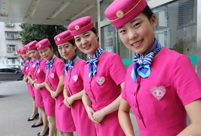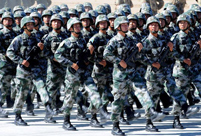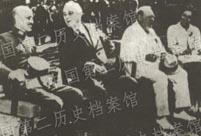 YOG kicks off in Nanjing
YOG kicks off in Nanjing
 Colorful life at Youth Olympic Village of Nanjing 2014 YOG
Colorful life at Youth Olympic Village of Nanjing 2014 YOG
 Royal Taoist temple to open to public
Royal Taoist temple to open to public
 Female soldiers at quake-hit area
Female soldiers at quake-hit area
 Shocking photos of cruel battles in Ukraine
Shocking photos of cruel battles in Ukraine
 Amphibious armored vehicle unit conducts open sea drill
Amphibious armored vehicle unit conducts open sea drill
 Water relay in Henan
Water relay in Henan
 Ethnic culture feasts eyes of travelers
Ethnic culture feasts eyes of travelers
 80 security dogs assembled in Nanjing police dog training base
80 security dogs assembled in Nanjing police dog training base
 Graffiti artists paint on street walls in Xinjiang
Graffiti artists paint on street walls in Xinjiang
To fulfill its commitments, to reassure its skeptical allies, and to address China properly.
U.S. President Barack Obama is set to visit Japan, the Republic of Korea, Malaysia and the Philippines this week. As the tense Asian climate continues over territorial disputes, Obama's upcoming visit to the region has attracted great attention.
The Obama administration has previously announced the "Asia pivot", a strategy which involves greater U.S. military deployment and economic intervention in the region, to counter the rise of China. Obama's upcoming visit is clearly intended to show his commitment to this strategy. Meanwhile the strategy faces three challenges: to reassure its skeptical allies, to avoid inflaming tensions with China, and to assert its commitment with concrete measures.
Over the past year, the Obama administration has found itself entangled in a number of traditional hotspots, including the Middle East and Eastern Europe. Congress negotiations have dragged on over the proposed U.S.-led trans-Pacific trade pact that is widely seen as the economic centerpiece of Obama's Asian strategy. Obama also abruptly canceled two Asian summits last fall to deal with a U.S. government shutdown.
All of this has helped to fuel skepticism about the United States' commitment to Asia – now Obama's upcoming four-nation Asian trip offers a chance for the U.S. to live up to its promises.
Despite White House optimism, many are pessimistic about the results of the trip. Analysts say that with the departure of Hilary Clinton and Thomas Donilon, confidence in the Asia pivot is no longer as strong as when first raised. Their successors, John Kerry and Suzan Rice have been focusing more on the Ukraine, Syria, the Middle East and Iran. Various factors have contributed to the U.S. absence in Asia, and the whole Asia pivot strategy is in danger.
The toughest challenge for Obama will be to reassure skeptical leaders that the United States intends to be more than just a casual observer.
There is also suspicion among U.S. Asian allies (including Japan and the Philippines) that if they come under threat from China, the United States - despite treaty obligations to come to their aid - might craft a response aimed more at limiting any damage to its own vital relationship with China, the world's second-biggest economic power.
For Obama, the tricky part of the trip is to soothe U.S. allies in Asia while avoiding stoking tensions with China. "Obama's upcoming visit will be the most critical test of this administration's Asia policy," says Richard Jacobson, a Manila-based analyst.
Meanwhile, the Obama administration needs to demonstrate with tangible and concrete measures that the Asia pivot is real. "It was a welcome policy change. But we do not see any actual sign of its implementation," says Yukio Okamoto, a former Japanese government adviser. "The U.S. needs to act now."
Obama is set to visit Japan from April 23 to 25, when he will meet the Japanese Prime Minister Shinzo Abe. "The president's visit is in the spotlight, but differences of opinion among leaders cannot be ignored." The Reuters agency said that during their meeting, Obama and Abe would battle negative undercurrents and deliver the message that the U.S.-Japan alliance is firm.
Reuters added that the U.S.-Japan alliance is undoubtedly the foundation of American policy in Asia. But U.S. attention to its relationship with China is increasing with the rise of China. Japan worries that in the future the U.S. may gradually come to see China as more of an asset than Japan. To counter Japan's worries, the Obama administration has chosen Tokyo as its first stop in Asia. Meanwhile, Abe needs the occasion to assure the U.S. that his right-wing speeches will not damage America's economic policies or security interests. In addition, Reuters notes that Obama and Abe need to prove that the Trans-Pacific Partnership is progressing.
This article is edited and translated from "能否兑现承诺?能否打消盟友疑虑?如何面对中国?奥巴马"重返亚太"面临三大挑战"; Source: Jiefang Daily
 Special holidays
Special holidays World's top 10 fighters
World's top 10 fighters 'Stewardesses' serve in hospital
'Stewardesses' serve in hospital Beautiful night scenery of Nanjing
Beautiful night scenery of Nanjing ‘Peace Mission -2014’ joint anti-terror military exercise kicks off in China
‘Peace Mission -2014’ joint anti-terror military exercise kicks off in China Eye-catching guides at the opening ceremony of YOG in Nanjing
Eye-catching guides at the opening ceremony of YOG in Nanjing A female missile launch company of PLA
A female missile launch company of PLA China, the U.S., Britain and the Soviet Union call for Japan's unconditional surrender
China, the U.S., Britain and the Soviet Union call for Japan's unconditional surrender The biggest duty-free store of the world
The biggest duty-free store of the world Volunteers bid farewell to YOG
Volunteers bid farewell to YOG More police dogs join anti-terror campaign in Inner Mongolia
More police dogs join anti-terror campaign in Inner Mongolia Picturesque Dayilan Manchu village in NE China
Picturesque Dayilan Manchu village in NE China Athletes experience the charm of Chinese traditional opera in Nanjing
Athletes experience the charm of Chinese traditional opera in Nanjing Contestants for Miss Bikini World experience Chinese traditional culture
Contestants for Miss Bikini World experience Chinese traditional cultureDay|Week|Month